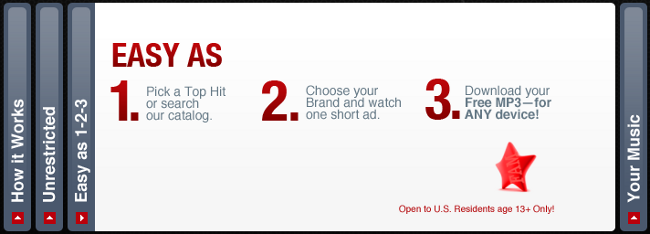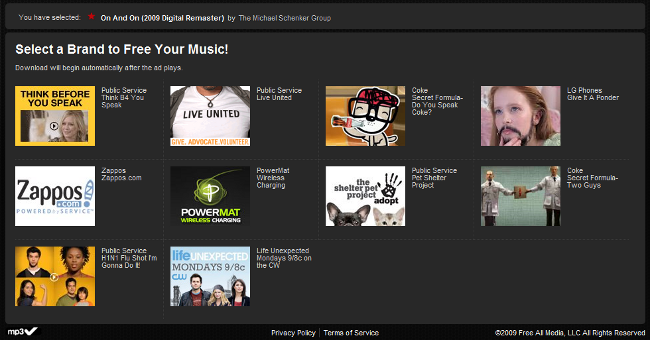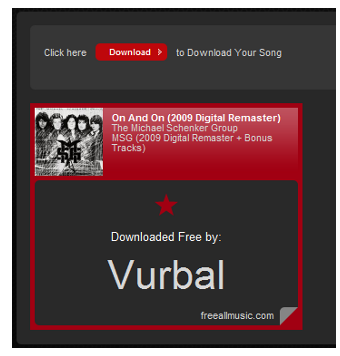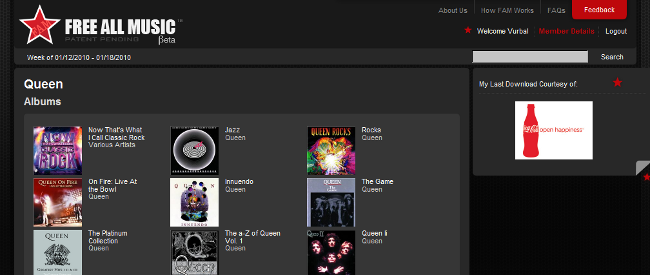
Keep in mind that Free All Music is currently in beta testing, and may change significantly, perhaps many times, by its public launch. If you'd like to check it out for yourself, and are in the US and at least 13 years old, you can sign up for the Beta waiting list on their website.
How It Works
Previous attempts to offer free music downloads, like SpiralFrog and Qtrax, have offered DRM laden Windows Media tracks paid for by standard background ads seen on many web pages. The problem is these files don't play on most portable media players - no iPods or Zunes for example. Since the DRM is tied to your computer you also have to download multiple copies if you want to listen to a song from multiple computers.Free All Music uses a different approach. Downloaded music is in standard MP3 format. You can play it on pretty much any portable media player and make copies for multiple devices from a single download. You're limited to five downloads in a week and required to watch a short video ad before each download.
Music Selection
The selection of music was actually very impressive. It's not quite comparable to what you would expect to see in a typical online music store, but it's significantly more complete than the initial selection offered by either SpiralFrog or Qtrax.
It's difficult to gauge the interface yet. So far it's pretty simple, but clearly unfinished. In fact, aside from the video ads you must watch to download music, there are very few ads anywhere on the site yet. For obvious reasons (the closed beta) the options for sharing tracks with other people via Twitter or Facebook aren't active either. And there are no options to find similar songs or artists to whatever you're currently viewing.
But what is there is impressive because it's simply designed and works reliably. Perhaps the biggest problem I've seen with music services, commercial or free, is a tendency to get all the advertising and bells and whistles working first and somehow not have primary features like browsing for artists or searching for songs quite working correctly. Or more often they work, but aren't as easy to use as you would expect.

You can search for an artist, song or album or look at various lists of popular or genre selections. The download process involves just a couple of clicks interrupted for a few seconds by a video ad. Once your music is downloaded you can move or copy it to the computer or device of your choice just like any other MP3 file.

Free Music Tuesdays
Every Tuesday every Free All Music member receives 5 free downloads which appear to be valid only for that week. In addition I got 2 bonus downloads when I signed up. The number is based on an estimate of how much music the average iTunes customer buys, and is actually somewhat higher than what was initially announced several months ago.Quality is also good. All the files I downloaded were encoded at either 256kbps or 320kbps, most with the LAME MP3 encoder. There's a watermark included to identify the Free All Music subscriber who downloaded it, but I couldn't detect it listening to the songs using my HTPC and home stereo.
The Price of Free Music
That watermark, along with some interesting language in Free All Music's Privacy Policy, is a reminder that the music you're downloading is still coming from the same labels that have attempted to block or privately regulate every useful digital audio technology and severely limited legal online music distribution.Watermarking is the price for allowing the distribution of DRM-free files. It includes information to match your Free All Music account with each file you download. There doesn't appear to be any personal information embedded in the files, or at least none you can find through simple means. At the same time, the watermark will no doubt be enough to lose Free All Music at least a few potential users.
What's of more concern is a provision in their Privacy Policy which explains how the watermark could be used.
"the watermark may be linked to your personally-identifiable information in our systems to allow us to investigate or report unauthorized copies of the music file, and you agree that we may share this information with third parties in the course of such investigation or report."
On the surface this is pretty innocuous. It seems to simply lets content owners (or their legal representatives) find out who owns a file when they discover it on a P2P network.
Then again maybe not. You see there's more information collected about you than just what you tell All Free Media about yourself when you sign up. Various data about your connection, including (but not limited to) IP address and ISP information is tracked automatically. Information collected during this process would seem to count as "personally-identifiable," and therefore be fair game to release under the terms listed above.
When I sign up for a service I want to be assured they will protect all information they collect about me to the fullest extent of the law. Requiring me to meet the demands of record labels and surrender some of that legal protection seems backward - but perhaps no less than I should expect. Without more specifics about exactly what information they're willing to disclose to investigators, apparently without any real due process, this provision worries me.
Prohibition Against Ringtones
Free All Music's Terms of Service did give me a good laugh with one restriction on the use of their files. You are not licensed to use them as ringtones. How that could be enforced (without draconian changes to the ToS) or by what reasoning using downloaded music as a ringtone doesn't qualify for a fair use exemption isn't explained.Conclusion
There's no question that DRM-free music which will play on any device you own is certainly an improvement over previous ad-supported music experiments. But there are a lot of hurdles for Free All Music to clear in order to be successful. 5 songs a week may be suitable for the "average" iTunes customer, but many music enthusiasts probably won't find it worth bothering with. Can Free All Music attract enough casual music fans to be successful?And what happens the first time the RIAA comes looking for personal information in the prosecution of a file sharing lawsuit? Will information beyond the ownership of specific files really be turned over without benefit of legal due process? And what information?
What about profitability? It seems unlikely a single video ad will cover licensing costs for a download. Can Free All Music attract enough advertising dollars and generate enough ad views to cover their expenses?

In fact as a service it succeeds rather well. The question is whether they can be equally successful attract subscribers and advertisers while keeping labels happy?
Written by: Rich Fiscus @ 13 Jan 2010 12:56
